Sprint Nextel’s Destiny and the Demand for a New Wireless Future reports on how Sprint Nextel is betting its future on a new wired society.
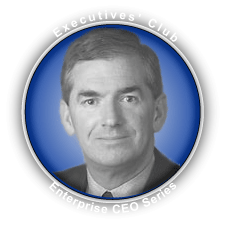 Gary D. Forsee, Chairman and CEO, Sprint Nextel Corporation, set the stage for the Executives’ Club of Chicago’s Technology Conference by outlining Sprint’s wireless strategy and a new vision for global community at the March enterprise CEO luncheon at the Chicago Hilton. Gary D. Forsee, Chairman and CEO, Sprint Nextel Corporation, set the stage for the Executives’ Club of Chicago’s Technology Conference by outlining Sprint’s wireless strategy and a new vision for global community at the March enterprise CEO luncheon at the Chicago Hilton.
Sprint’s long history reflects the transformation of the U.S. telecoms market. The company has had a key role in remaking the U.S. telecoms industry during its privatization. It competed as a competitive local exchange carrier (CLEC) and once earned most of its revenue from long distance services, which are now essentially free. After its 2005 merger with Nextel, virtually all its revenue comes from wireless services.
Moreover, Mr. Forsee promised that Chicago would be one of two pilot cities for Sprint’s WiMAX initiative later this year. Chicagoans will be among the first in the U.S. to try 4G network services.
Sprint’s Wireless Future
Sprint Nextel has seen the future, and it […]
UPS: Transforming Package Delivery into a One-to-One Business summarizes the CEO’s vision for meeting customer empowerment with transformation.
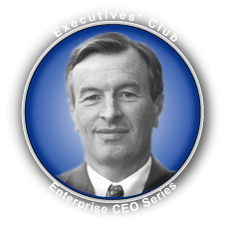 Michael L. Eskew, Chairman and CEO of UPS, outlined the package delivery giant’s vision for transforming itself into a “one-to-one” business at the Executives’ Club of Chicago’s Enterprise CEO Lunch, 15 February 2007. Before a packed house at the Chicago Hilton, he demonstrated UPS’s creative “whiteboard” marketing campaign and explained its role in communicating to customers the value of the company’s transformation. Michael L. Eskew, Chairman and CEO of UPS, outlined the package delivery giant’s vision for transforming itself into a “one-to-one” business at the Executives’ Club of Chicago’s Enterprise CEO Lunch, 15 February 2007. Before a packed house at the Chicago Hilton, he demonstrated UPS’s creative “whiteboard” marketing campaign and explained its role in communicating to customers the value of the company’s transformation.
The importance of UPS’s vision extends beyond UPS stakeholders because it reflects a shift in emphasis away from industrial efficiency to knowledge-based innovation. Make no mistake, efficiency is mission-critical to every business, but fewer companies can differentiate based on efficiency. To its considerable credit, UPS sees the shift and is striving to empower customers with information as well as delivery services.
A History of Transformation
Mr. Eskew set the context by emphasizing that UPS has a history of transforming itself to meet technology and market challenges:
Founder Jim Casey began the company as bicycle messenger service in 1907, but emerging technology, […]
Media Reflects Power Shift away from Producers to Consumers—Glimpses of Consumer Empowerment
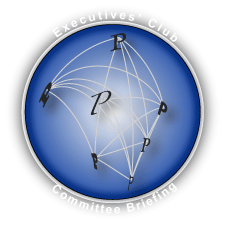 The Executives’ Club of Chicago assembled a visionary panel to give Midwest business leaders their advice for media communications in the (“new” ,^) digital age. Rishad Tobaccowala, CEO, Denuo Group and Chief Innovation Officer, Publicis; Dr. Jim Taylor, Vice Chairman, The Harrison Group and Emily L. Barr, President & General Manager, ABC 7 Chicago were panelists, and Susan D. Whiting, Chairman, Nielsen Media Research moderated the breakfast, which took place 30 January 2007 at Chicago’s Mid-America Club. The Executives’ Club of Chicago assembled a visionary panel to give Midwest business leaders their advice for media communications in the (“new” ,^) digital age. Rishad Tobaccowala, CEO, Denuo Group and Chief Innovation Officer, Publicis; Dr. Jim Taylor, Vice Chairman, The Harrison Group and Emily L. Barr, President & General Manager, ABC 7 Chicago were panelists, and Susan D. Whiting, Chairman, Nielsen Media Research moderated the breakfast, which took place 30 January 2007 at Chicago’s Mid-America Club.
Ours is rapidly becoming a P2P world in which individuals communicate with individuals digitally, and this represents a profound shift for media companies, their clients and everyone’s customers. The focus of the morning discussion was “media”—television, print, radio—which are still largely organized to deliver one message to an audience of many. Of course, the “mass” has always been comprised of individuals, but their alternatives to mass media have been few until fairly recently. Now they are tuning out mass messaging in favor of more relevant communications, which increasingly come from—other individuals. Meantime, people are increasingly connected via the Internet (whether through mobile […]
Economic Outlook for 2007 Reveals Pockets of Opportunity + Political Handicapping
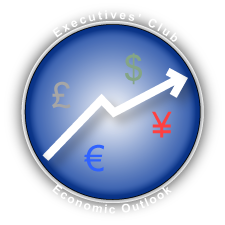 The Executives’ Club of Chicago assembled an all-star panel to give Midwest business leaders their guidance for various aspects of the U.S. economy in 2007. Diane Swonk, Chief Economist of Mesirow Financial, Alan Murray, Assistant Managing Editor of The Wall Street Journal and Robert “Bob” Froehlich, Chairman of the Investment Strategy Committee, Deutsche Asset Management broke out their respective crystal balls for 2007, and the audience was not disappointed for lack of insight or wit. The session was scintillatingly moderated by Terry Savage, Financial Columnist of the Chicago Sun-Times. The Executives’ Club of Chicago assembled an all-star panel to give Midwest business leaders their guidance for various aspects of the U.S. economy in 2007. Diane Swonk, Chief Economist of Mesirow Financial, Alan Murray, Assistant Managing Editor of The Wall Street Journal and Robert “Bob” Froehlich, Chairman of the Investment Strategy Committee, Deutsche Asset Management broke out their respective crystal balls for 2007, and the audience was not disappointed for lack of insight or wit. The session was scintillatingly moderated by Terry Savage, Financial Columnist of the Chicago Sun-Times.
The consensus was that the U.S. economy would have a relatively benign year in 2007. All panelists predicted a higher Dow, and their predictions concurred with Wall Street’s most accurate ,^) indicator, the Super Bowl Predictor. Little of import will happen on the political front, the U.S. economy will grow at a slower pace, and investment returns will be generally highest outside the U.S. Elsewhere, consumer empowerment reared its head in the executive pay issue, […]
High Potential for Business Innovation
 Plus ça change* was the theme of The Executives’ Club of Chicago High Technology Conference December eighth, where an esteemed panel gave varying perspectives on Chicago’s importance as a technology center. William Avery of Brunswick Corporation, James O’Connor, Jr. of Motorola, Inc. and Ira H. Cohen of Goldman, Sachs & Co. spoke about technology from enterprise IT, mobile technology and investment points of view respectively. Prior to their prepared remarks, John Gentry of CSC Consulting outlined key results of the forthcoming Chicago Technology Outlook Survey, in which corporate technology leaders commented on IT trends for 2007 as well as Chicago’s role as a technology center. He moderated the panel during a Q&A session. Plus ça change* was the theme of The Executives’ Club of Chicago High Technology Conference December eighth, where an esteemed panel gave varying perspectives on Chicago’s importance as a technology center. William Avery of Brunswick Corporation, James O’Connor, Jr. of Motorola, Inc. and Ira H. Cohen of Goldman, Sachs & Co. spoke about technology from enterprise IT, mobile technology and investment points of view respectively. Prior to their prepared remarks, John Gentry of CSC Consulting outlined key results of the forthcoming Chicago Technology Outlook Survey, in which corporate technology leaders commented on IT trends for 2007 as well as Chicago’s role as a technology center. He moderated the panel during a Q&A session.
The net-net: Chicago has a way to go before it becomes a preeminent technology center; however, its best chance for creating breakaway value through innovation will lie in not focusing on technology, as explained in Analysis and Conclusions.
[…]
The TransAtlantic Partnership’s Implications for U.S., E.U. Economies summarizes coverage of the EEC International Conference—Talking with the Ambassadors of the World’s Largest Trading Relationship and the CEOs of Four Global Enterprises.
 Three eminent diplomatic leaders and CEOs from Baxter, Financial Dynamics, ITW and Philips briefed Midwest executives on the current status and future directions of the world’s largest trading relationship at the Executives’ Club of Chicago’s International Conference November 15. The half-day program featured several presentations, a CEO panel and a media round table. All speakers sought to impress upon the audience the pivotal importance of the transatlantic alliance for the United States and Europe, and most warned chief executives neither to take it for granted nor to be passive in the face of rising protectionism. Three eminent diplomatic leaders and CEOs from Baxter, Financial Dynamics, ITW and Philips briefed Midwest executives on the current status and future directions of the world’s largest trading relationship at the Executives’ Club of Chicago’s International Conference November 15. The half-day program featured several presentations, a CEO panel and a media round table. All speakers sought to impress upon the audience the pivotal importance of the transatlantic alliance for the United States and Europe, and most warned chief executives neither to take it for granted nor to be passive in the face of rising protectionism.
The fact that the importance of the E.U.—U.S. alliance had to be emphasized brought into sharp relief the relatively sudden rise of Asia as well as the shift from the Industrial Economy to the Knowledge Economy. Both megatrends pose opportunities and threats for the world’s largest economies and enterprises, and […]
Advice from three successful CIOs
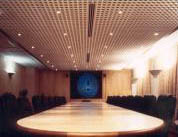 In the past 15 years, “enterprise IT” has been transformed from an accounting support function to the driver-enabler for innovation and value creation. By no means has this been a smooth transformation, as businesses in all industries are besieged by globalization, new competitors and rampant commoditization. At many companies, executives around the boardroom table have had mixed feelings about IT in the face of huge expenditures and uncertain ROIs. In the past 15 years, “enterprise IT” has been transformed from an accounting support function to the driver-enabler for innovation and value creation. By no means has this been a smooth transformation, as businesses in all industries are besieged by globalization, new competitors and rampant commoditization. At many companies, executives around the boardroom table have had mixed feelings about IT in the face of huge expenditures and uncertain ROIs.
At the Executives’ Club of Chicago High Technology Conference last week, Michael S. Carlin of Hospira, Richard Shellito of State Farm Insurance and Randy G. Burdick of OfficeMax shared their advice on keeping IT relevant in the boardroom. After their prepared remarks, Winifred A. Gillen of Capgemini moderated the panel during a Q&A session.
[…]
|
|
 Gary D. Forsee, Chairman and CEO, Sprint Nextel Corporation, set the stage for the Executives’ Club of Chicago’s Technology Conference by outlining Sprint’s wireless strategy and a new vision for global community at the March enterprise CEO luncheon at the Chicago Hilton.
Gary D. Forsee, Chairman and CEO, Sprint Nextel Corporation, set the stage for the Executives’ Club of Chicago’s Technology Conference by outlining Sprint’s wireless strategy and a new vision for global community at the March enterprise CEO luncheon at the Chicago Hilton.
 Michael L. Eskew, Chairman and CEO of UPS, outlined the package delivery giant’s vision for transforming itself into a “one-to-one” business at the Executives’ Club of Chicago’s Enterprise CEO Lunch, 15 February 2007. Before a packed house at the Chicago Hilton, he demonstrated UPS’s creative “whiteboard” marketing campaign and explained its role in communicating to customers the value of the company’s transformation.
Michael L. Eskew, Chairman and CEO of UPS, outlined the package delivery giant’s vision for transforming itself into a “one-to-one” business at the Executives’ Club of Chicago’s Enterprise CEO Lunch, 15 February 2007. Before a packed house at the Chicago Hilton, he demonstrated UPS’s creative “whiteboard” marketing campaign and explained its role in communicating to customers the value of the company’s transformation. The Executives’ Club of Chicago assembled a visionary panel to give Midwest business leaders their advice for media communications in the (“new” ,^) digital age. Rishad Tobaccowala, CEO, Denuo Group and Chief Innovation Officer, Publicis; Dr. Jim Taylor, Vice Chairman, The Harrison Group and Emily L. Barr, President & General Manager, ABC 7 Chicago were panelists, and Susan D. Whiting, Chairman, Nielsen Media Research moderated the breakfast, which took place 30 January 2007 at Chicago’s Mid-America Club.
The Executives’ Club of Chicago assembled a visionary panel to give Midwest business leaders their advice for media communications in the (“new” ,^) digital age. Rishad Tobaccowala, CEO, Denuo Group and Chief Innovation Officer, Publicis; Dr. Jim Taylor, Vice Chairman, The Harrison Group and Emily L. Barr, President & General Manager, ABC 7 Chicago were panelists, and Susan D. Whiting, Chairman, Nielsen Media Research moderated the breakfast, which took place 30 January 2007 at Chicago’s Mid-America Club. The Executives’ Club of Chicago assembled an all-star panel to give Midwest business leaders their guidance for various aspects of the U.S. economy in 2007. Diane Swonk, Chief Economist of Mesirow Financial, Alan Murray, Assistant Managing Editor of The Wall Street Journal and Robert “Bob” Froehlich, Chairman of the Investment Strategy Committee, Deutsche Asset Management broke out their respective crystal balls for 2007, and the audience was not disappointed for lack of insight or wit. The session was scintillatingly moderated by Terry Savage, Financial Columnist of the Chicago Sun-Times.
The Executives’ Club of Chicago assembled an all-star panel to give Midwest business leaders their guidance for various aspects of the U.S. economy in 2007. Diane Swonk, Chief Economist of Mesirow Financial, Alan Murray, Assistant Managing Editor of The Wall Street Journal and Robert “Bob” Froehlich, Chairman of the Investment Strategy Committee, Deutsche Asset Management broke out their respective crystal balls for 2007, and the audience was not disappointed for lack of insight or wit. The session was scintillatingly moderated by Terry Savage, Financial Columnist of the Chicago Sun-Times. Plus ça change* was the theme of The Executives’ Club of Chicago High Technology Conference December eighth, where an esteemed panel gave varying perspectives on Chicago’s importance as a technology center. William Avery of Brunswick Corporation, James O’Connor, Jr. of Motorola, Inc. and Ira H. Cohen of Goldman, Sachs & Co. spoke about technology from enterprise IT, mobile technology and investment points of view respectively. Prior to their prepared remarks, John Gentry of CSC Consulting outlined key results of the forthcoming Chicago Technology Outlook Survey, in which corporate technology leaders commented on IT trends for 2007 as well as Chicago’s role as a technology center. He moderated the panel during a Q&A session.
Plus ça change* was the theme of The Executives’ Club of Chicago High Technology Conference December eighth, where an esteemed panel gave varying perspectives on Chicago’s importance as a technology center. William Avery of Brunswick Corporation, James O’Connor, Jr. of Motorola, Inc. and Ira H. Cohen of Goldman, Sachs & Co. spoke about technology from enterprise IT, mobile technology and investment points of view respectively. Prior to their prepared remarks, John Gentry of CSC Consulting outlined key results of the forthcoming Chicago Technology Outlook Survey, in which corporate technology leaders commented on IT trends for 2007 as well as Chicago’s role as a technology center. He moderated the panel during a Q&A session. Three eminent diplomatic leaders and CEOs from Baxter, Financial Dynamics, ITW and Philips briefed Midwest executives on the current status and future directions of the world’s largest trading relationship at the Executives’ Club of Chicago’s International Conference November 15. The half-day program featured several presentations, a CEO panel and a media round table. All speakers sought to impress upon the audience the pivotal importance of the transatlantic alliance for the United States and Europe, and most warned chief executives neither to take it for granted nor to be passive in the face of rising protectionism.
Three eminent diplomatic leaders and CEOs from Baxter, Financial Dynamics, ITW and Philips briefed Midwest executives on the current status and future directions of the world’s largest trading relationship at the Executives’ Club of Chicago’s International Conference November 15. The half-day program featured several presentations, a CEO panel and a media round table. All speakers sought to impress upon the audience the pivotal importance of the transatlantic alliance for the United States and Europe, and most warned chief executives neither to take it for granted nor to be passive in the face of rising protectionism. In the past 15 years, “enterprise IT” has been transformed from an accounting support function to the driver-enabler for innovation and value creation. By no means has this been a smooth transformation, as businesses in all industries are besieged by globalization, new competitors and rampant commoditization. At many companies, executives around the boardroom table have had mixed feelings about IT in the face of huge expenditures and uncertain ROIs.
In the past 15 years, “enterprise IT” has been transformed from an accounting support function to the driver-enabler for innovation and value creation. By no means has this been a smooth transformation, as businesses in all industries are besieged by globalization, new competitors and rampant commoditization. At many companies, executives around the boardroom table have had mixed feelings about IT in the face of huge expenditures and uncertain ROIs.